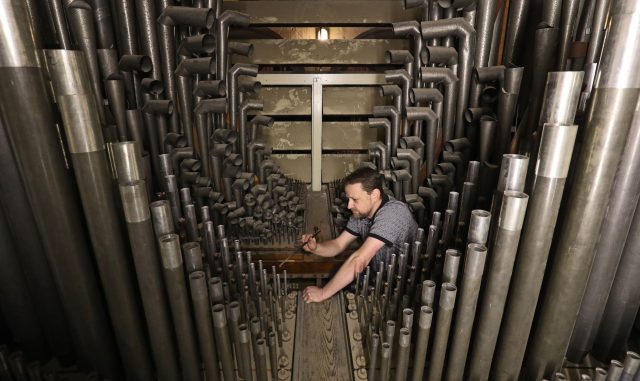Organ Tuner Chris Wintle at work in the organ loft of Canterbury Cathedral in Kent, as he tunes one of over 3000 pipes in the loft which make up the organ in time for the Christmas services (Credit Image: Gareth Fuller/PA Wire/PA Images)

Is your job safe? There are many people who don’t think so. Such is the potential of artificial intelligence, machine learning and robotics that great swathes of the human workforce could soon find themselves surplus to requirements.
It’s an issue that we’ve covered extensively on UnHerd – for instance, here and here. Indeed, our technology editor Nigel Cameron has written a whole book about it. But is there anything you can do to prepare for the impending jobocalypse?
Obviously, you need to develop skills and specialisms that are likely to stay in demand, but which can’t, or won’t, ever be automated. The difficult part, of course, is trying to predict which skills, which specialisms.
In a fascinating piece for the Boston Globe, Alan Wirzbicki indirectly provides us with some valuable clues. I say indirectly, because his essay isn’t about how to survive new technologies, but rather how to save old ones.
His first example is the 70-millimeter film format:
“Lauded for its crisper colors, deeper blacks, and higher-resolution images, fans see 70-millimeter as the highest expression of Hollywood artistry. The format was popularized in the 1950s to showcase movies’ technical superiority over television, and reserved for major productions like ‘Ben-Hur’ and ‘Lawrence of Arabia.’ But today, with Hollywood’s near-total shift to digital projection, the format faces an uncertain future — and is only held together, as a labor of love, by the efforts of a passionate community of movie fans.”
The onward march of technology means that older technologies and the skills required to use them can be lost. Wirzbicki makes the insightful point that “it’s the most recently developed skills that may be the most vulnerable to disappearing forever.” That’s because compared to, say, traditional crafts, newly obsolete tech may be too complex for enthusiasts to keep going.
For instance, to ensure that future generations can enjoy 70-millimeter films, all of the following would have to happen:
“Kodak would need to keep producing film; the sole remaining 70-millimeter lab would have to maintain the ability to produce and distribute new prints; theaters would have to spend years training new projectionists; companies would need to pass down an understanding of how to make obsolete parts for which the original designs may have disappeared.”
In Wirzbicki describes this as “an entire ecosystem of specialized crafts and esoteric skills” – and if any of the components is lost then the whole thing collapses.
Another example is the building and repair of traditional pipe organs. Again, there are digital alternatives, but these can only approximate the depth of experience provided by the original. Fortunately, the ‘ecosytem’ required to keep this technology alive appears to be well established:
“C.B. Fisk, a Gloucester organ builder that makes traditional instruments and has steady demand from universities and religious institutions… the firm offers an apprentice program, which attracts applicants worldwide. ‘There aren’t any schools for organ building in the United States, so the shop has always functioned as one.’”
There is a lesson here for all of us. I’m not suggesting that we all retrain as projectionists and organ builders. Rather we should think about the jobs we do now and what would be lost if they were done by an automated system. Would your electronic replacement be the equivalent of a digital pipe organ or an automated teller machine? Would something of enduring value disappear from our culture or would it just be a case of mechanising a necessary, but ultimately boring, economic function? If whatever spark of God-given creativity you bring your job were to be extinguished, would the loss be outweighed by the ability of a robot to perform the task ten times faster and at a tenth of the cost?
In a world where most goods and services become increasingly abundant as a result of automation, the ability to add to the human experience in an irreplaceable and enriching manner will become evermore valuable.










Join the discussion
Join like minded readers that support our journalism by becoming a paid subscriber
To join the discussion in the comments, become a paid subscriber.
Join like minded readers that support our journalism, read unlimited articles and enjoy other subscriber-only benefits.
Subscribe